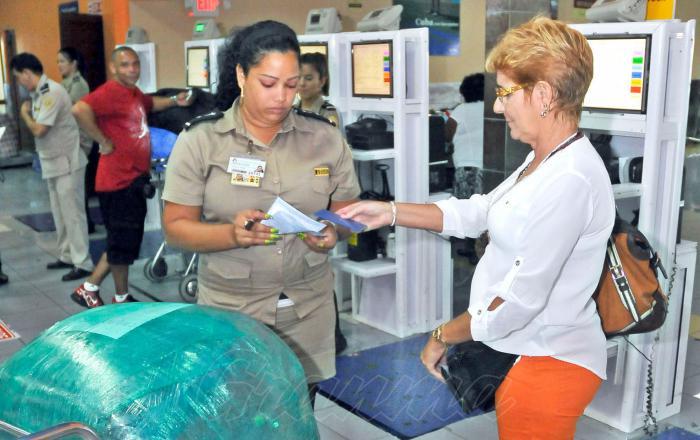New rules for the regulation of the profit limit on purchases and tariff exemption are established
- Written by Susana Anton, Granma
- Published in Cuba
- Hits: 949
 The Official Gazette No.57 published in its ordinary version, this Thursday, a group of Resolutions of the Ministries of Finance and Prices (MFP), Public Health (Minsap) and the General Customs of the Republic (AGR) that establish the regulation of the profit limit in the purchases of the state sector to the non-state sector and extend the tariff exemption for food, cleaning products, medical supplies and medicines.
The Official Gazette No.57 published in its ordinary version, this Thursday, a group of Resolutions of the Ministries of Finance and Prices (MFP), Public Health (Minsap) and the General Customs of the Republic (AGR) that establish the regulation of the profit limit in the purchases of the state sector to the non-state sector and extend the tariff exemption for food, cleaning products, medical supplies and medicines.
The Official Gazette No.57 published in its ordinary version, this Thursday, a group of Resolutions of the Ministries of Finance and Prices (MFP), Public Health (Minsap) and the General Customs of the Republic (AGR) that establish the regulation of the profit limit in the purchases of the state sector to the non-state sector and extend the tariff exemption for food, cleaning products, medical supplies and medicines.
In the case of the first one, corresponding to Resolution 209 of the MFP, the head of the agency, Vladimier Regueiro Ale, explained to Granma that it seeks to order the containment of expenses incurred by state entities in their economic relations with non-state management forms.
With the entry into force of the regulation on July 1st, only prices and tariffs that recognize up to a 30% profit margin or profit on goods and services acquired from the non-state sector, whether self-employed, MSMEs or Non-Agricultural Cooperatives, will be accepted.
He added that it is a way to order and optimize the resources generated from the budgeted sector.
"We have seen in recent times a concentration of payments increasing, even, financing for the acquisition of goods and services. This requires attention and it is being recognized up to 30%, which is a significantly beneficial profit margin for this first moment of orderly relations", he highlighted.
Regueiro Ale affirmed that the norm demands an exchange, a greater approach and review of what is contracted today; besides creating the basis for future contracting.
It is not a matter, he said, of limiting this relationship, but of establishing them with a better order in terms of prices, implying the reaffirmation of the use of price sheets and other established mechanisms that sometimes do not complement each other, such as the agreement of prices, bidding and the search for better offers in the territory.
He remarked that the regulation includes a training that has been extended to the economic and accounting teams of the Central State Administration Agencies, the local bodies of the People's Power and that it should also involve the non-state economic actors themselves who are service providers to the state sector.
Regueiro Ale insisted on the importance of keeping the accounting as established, which can be done with own resources, with the automated national systems, with accounting advice that can be obtained from other forms of non-state management or also from professional services provided by state entities according to the complexity of the operations.
He clarified that, previously, Resolution 148 of the MFP established the profit margins for the state sector and, in this case, it is adjusted between the state sector and the non-state sector.
The Minister emphasized that this measure also favors the containment of expenses from the budgeted sector, consistent with the macroeconomic stabilization program to improve fiscal results.
EXTENSION FOR THE EXEMPTION OF CUSTOMS DUTIES ON FOOD, TOILETRIES AND MEDICINES IS EXTENDED
On the other hand, as from July 1st, the exemption from payment of the customs tax on products imported by passengers as accompanied baggage corresponding to food, toiletries, medical supplies and medicines will be in effect until September 30th.
It also authorizes, on an exceptional and temporary basis, the non-commercial import of food, toiletries, medicines and medical supplies up to a limit of USD 500 in value or equivalent weight and 50 kg in the value/weight ratio established by the AGR.
In the case of air, sea and postal shipments of imports by individuals, the limit of USD 200 or equivalent weight up to 20 kg is maintained.
Likewise, the increase of the value limit from 200 USD to 500 USD is maintained and the exemption from customs tax for the first 30 USD of the value or its equivalent weight of 3 kilograms of the shipment is ratified, and a tariff rate of 30% is applied to the excess of this.
All the provisions apply on the condition that the items classified as food or toiletries, as well as those identified as medicines and medical supplies, are presented to Customs in separate packages from the rest of the products.
These benefits, remarked the Minister, are based on the existing limitations in the domestic market to acquire them.
At the same time, he said, border controls continue to be reinforced to face a group of violating behaviors of people who, under the protection of these benefits, use them for lucrative business, which is not the meaning of these regulations.
